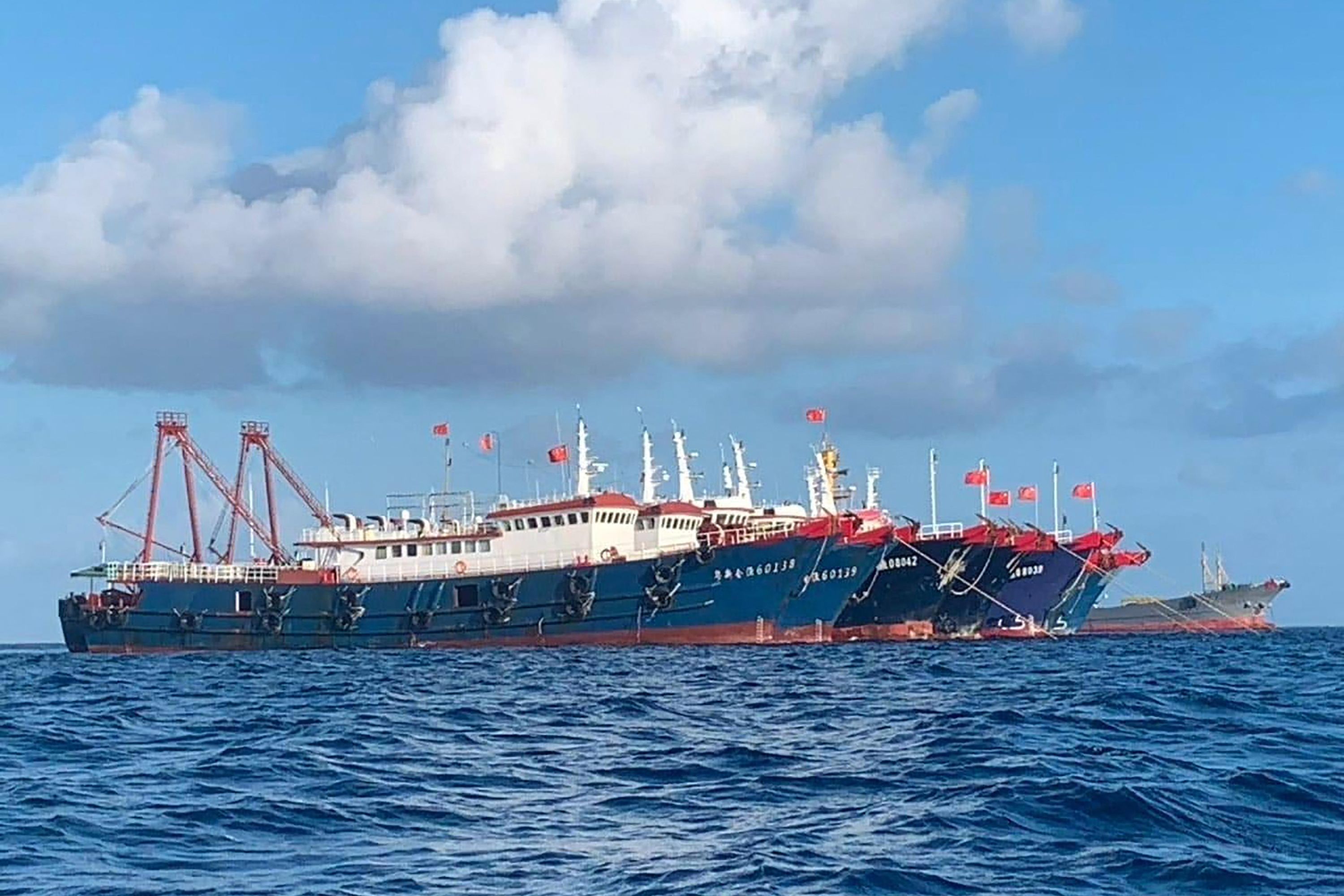The Asian Voice
Critic against Philippines' Unclos claim brings aid and comfort to China: Inquirer
The writer says Philippines armed forces officer's attempts to discredit claim are unfounded.
Sign up now: Get insights on Asia's fast-moving developments

Chinese vessels anchored at Whitsun Reef, some 320km west of Palawan Island in the South China Sea.
PHOTO: AFP/ PHILIPPINE COMMUNICATIONS OFFICE
MANILA (PHILIPPINE DAILY INQUIRER/ASIA NEWS NETWORK) - After the Philippines filed a landmark arbitration case against China on Jan 22, 2013, China's propagandists went overdrive on a public relations campaign, raising two issues to discredit the arbitration.
First, the Philippines brought the case before the Permanent Court of Arbitration (PCA), which is not a court. Second, any arbitration case against China could not proceed without the consent of China. Both the Philippines and China have ratified the United Nations Convention on the Law of the Sea (Unclos) and are bound by its provisions.
The first issue - that the arbitration was filed in the wrong court - was totally laughable and was simply ignored by the Philippine legal team. Even China did not include this issue in the official Position Paper it submitted to members of the arbitral tribunal.
As stated in the Philippines' initiatory pleading, called the Statement of Claim, the arbitration was filed under Article 281(1) of Unclos, which "allows recourse to the procedures provided for in Part XV, including compulsory procedures entailing binding decisions under Section 2 of Part VI." There was no mention whatsoever of the Permanent Court of Arbitration. As every international lawyer worth his attache case knows, the PCA is not a court but a registry that provides, for a fee, a physical venue for hearings, as well as administrative and secretarial services, to those wishing to hold their arbitrations in any of the various offices of the PCA worldwide.
The second issue - that China's consent is needed for the arbitration to proceed - is also laughable because as every student of the Law of the Sea knows, Unclos provides for a compulsory arbitration. Every state that ratified Unclos gave its consent in advance, upon ratifying Unclos, to be sued under the compulsory dispute settlement mechanism of Unclos. This is embodied in the Unclos arbitration provision which states: "Absence of a party or failure of a party to defend its case shall not constitute a bar to the proceedings."
On March 28, Lieutenant-General Antonio Parlade Jr., an incumbent officer of the Armed Forces of the Philippines known for red-tagging journalists, wrote in an online publication an opinion piece that repeated the long-discredited Chinese communist propaganda against the Arbitral Award. He wrote: "The Aquino administration took a legal strategy and brought the matter to the Permanent Court of Arbitration xxx."
Because the Permanent Court of Arbitration is not a court, Lt-Gen Parlade called the Arbitral Award a mere "piece of paper" that embodied a "kangaroo ruling". Thus, he even went further than the staid "null and void" appellation that China gave to the Arbitral Award.
Like the Chinese communist propagandists, Lt-Gen Parlade also questioned why the arbitral tribunal decided the case without the participation of China. He asked: "What loophole in heaven's name could have made all these possible without China and with only the Philippines participating?"
Lt-Gen Parlade even questioned why the Philippines failed to secure a ruling on the territorial dispute in favor of the Philippines. He wrote: "Was the Philippines awarded any territory? Nothing." The Philippines would have been foolish to raise a territorial issue because Unclos regulates only maritime disputes, not territorial disputes.
As the Philippines clearly stated in its Statement of Claim: "The Philippines does not seek in this arbitration a determination of which party enjoys sovereignty over the islands claimed by both of them." Had the Philippines raised a territorial issue, its arbitration case would have been dismissed outright by the arbitral tribunal.
Philippine President Rodrigo Duterte, in his speech before the UN General Assembly on Sept 22 last year, declared: "The Award is now part of international law xxx. We firmly reject attempts to undermine it."
Lt-Gen Parlade has gravely undermined the Arbitral Award by calling it a "kangaroo ruling", effectively repudiating his own commander-in-chief. On April 4 last year, Defence Secretary Delfin Lorenzana demanded: "China should respect Philippine xxx sovereign rights over its exclusive economic zone as defined by Unclos and affirmed by the Arbitral Award." Lt-Gen Parlade is operating outside the chain of command, repudiating his commander-in-chief and ridiculing the defence secretary, who is the President's alter ego.
Lt-Gen Parlade has clearly given "aid or comfort" to Communist China, which has occupied and continues to seize Philippine territory and maritime zones in the West Philippine Sea.
- The writer is a columnist with the Philippine Daily Inquirer. The paper is a member of The Straits Times media partner Asia News Network, an alliance of 23 news media organisations.


